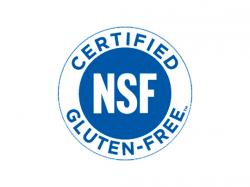NSF Science-Based Gluten-Free Certification Program Meets New FDA Gluten-Free Regulation
September 23, 2013 | 3 min to read

Ann Arbor, MI – NSF International, a global public health organization with nearly 70 years of food safety expertise, has confirmed that its science-based Gluten-Free Certification Program meets the U.S. Food and Drug Administration’s (FDA) new regulation defining the term “gluten-free” for voluntary food labeling.
The U.S. FDA recently published the final rule that sets a gluten limit of 20 parts per million (ppm) in foods labeled as “gluten-free,” “without gluten,” “free of gluten” or “no gluten.” Food manufacturers have a year from the date the rule was published (August 5, 2014) to bring their labels into compliance with the new requirements.
Gluten-free products certified via NSF International’s Gluten-Free Certification Program already meet the FDA’s new gluten-free labeling regulation. In 2011, NSF International developed its voluntary gluten-free standard and certification program, which verifies that certified products contain 20 ppm or less of gluten.
In addition to product testing, NSF audits the manufacturing facilities to ensure the manufacturing process prevents gluten contamination of products and reviews the formulations to ensure that the ingredients used are gluten-free. The program provides an added level of assurance to consumers, especially the more than 3 million Americans with celiac disease or gluten intolerance.
Widespread cross-contamination of source ingredients means that even manufacturers who singularly produce gluten-free products must incorporate adequate testing and verification protocols into their operating procedures. The stringent nature of the NSF certification protocols helps to ensure prevention of contamination and co-mingling, critically important for those with celiac disease and gluten intolerance.
“NSF International has nearly 70 years of experience in developing standards and certifying products to these standards. NSF has brought this same rigor to the gluten-free category with comprehensive annual inspection, ingredient verification, random product testing and on-site audits,” said Jaclyn Bowen, General Manager of NSF International Agriculture and QAI (Quality Assurance International), an NSF International Company.
“This truly independent approval process meets the FDA gluten-free labeling regulation to fill the gap between unsubstantiated claims and consumer demand for bona fide gluten-free products. In a sea of unsubstantiated claims, seals and logos, consumers and retailers need a certification that is science-based and verified through inspections and product testing,” said Bowen. “NSF International’s gluten-free label brings transparency and trust to people who need gluten-free foods as part of maintaining their healthy diet, and provides essential brand protection and assurance to the food producers, retailers and restaurants seeking to meet the needs of these consumers and the new regulation. Parts of the FDA regulation are still being clarified. NSF will continue to monitor the regulation to ensure our certification program remains consistent with their requirements.”
For more information on NSF/QAI gluten-free certification, contact Jonathan Lackie at 858-200-9708 or jlackie(at)nsf(dot)org, or visit NSF’s website. To view a list of certified gluten-free products visit QAI’s online listings.
To view FDA’s press release, visit FDA defines “gluten-free” for food labeling.
More gluten-free information for consumers can be found on NSF’s consumer website.
Editor’s note: To schedule an interview with an NSF gluten-free expert, contact Senior Communications Manager Greta Houlahan at houlahan(at)nsf(dot)org or +1 734-913-5723.
About NSF International:
NSF International is an independent global organization that writes standards, and tests and certifies products for the food, water, health sciences and consumer goods industries to minimize adverse health effects and protect the environment (nsf.org). Founded in 1944, NSF is committed to protecting human health and safety worldwide. Operating in more than 150 countries, NSF International is accredited by the American National Standards Institute (ANSI) and has been collaborating with the World Health Organization since 1997 in water quality and safety, food safety and indoor environments.
The NSF Global Food Division provides expertise and accredited services across all supply chain sectors, from agriculture, produce, processing, distribution and dairy, to seafood, retail and restaurants. Services include Global Food Safety Initiative (GFSI) certification (SQF, BRC, GLOBALG.A.P., FSSC 22000, IFS, CanadaGAP), plus expert auditing, consulting and technical services, HACCP validation and inspection, and organic and gluten-free certification through QAI (Quality Assurance International). NSF is also the leading certifier of foodservice equipment, nonfood compounds and bottled water/beverages.
Additional services include NSF Education and Training, drinking water certification and safety audits, management systems registrations (e.g. ISO 14001) delivered through NSF International Strategic Registrations; and sustainable business services through NSF Sustainability.
Source: NSF International
